Greenkeeper Training - Qualifications: Out of Africa!

Kevin Marks visited South Africa recently to see the programme in action
The Silver Lakes course opened for play in 1993 and is the centrepiece of a secure residential community of some 1,700 properties. The championship course, designed by Peter Matkowich, the renowned Zimbabwean-born course architect and former professional golfer, measures 6,700 metres from the back tees.
Built on a former floodplain, it features many ponds, dams and streams created to manage the water around which the holes were created. A feature of the design is the double-greened island for the incoming holes and also an island fairway, the first I've seen in my career as a golf writer.
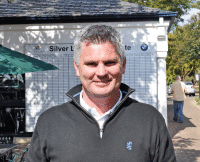
Andrew McKenna is a proud Scotsman who was born in Johannesburg and grew up at Powfoot Golf Club in Scotland. After joining the PGA in 1992, he played the Tartan Tour circuit for ten years, gaining his European Tour card in 1997. He played on the Sunshine Tour from 1998 until 2002, his first contact with the land of his birth since his family's move back to Scotland. His coaching career began in London in 2002, where he worked with John Jacobs and Jim Farmer before moving to South Africa as Director of Golf at the Euphoria Golf Estate situated in the Waterberg mountain range in the Limpopo Province. He established the Silver Lakes Golf Academy in 2010 and became Director of Golf in 2011.

"It is very much a passion at Silver Lakes to grow the game and open the doors of our facility to the African continent and provide a platform from which golf development, in all its forms, can be taken forward through an educational programme," Derek Le Roux said.
"A number of golf academies exist in South Africa and their sole focus is the development and training of potential professional golfers and PGA professionals. However, in reality, not all of the young people aspiring to become professionals are going to make it; that's the hard truth. So, what do they do, if they don't make it?"

"Instead of losing these youngsters from the wider golf industry, why don't we offer them some formal training in the art of greenkeeping, providing them with a long-term career if they don't make it as a Golf Pro?"
"If we are to progress the game of golf across the whole continent of Africa, then we have to have courses managed by trained people from the various African nations. To sustain a proper golf course, trained staff are needed to manage, nurture and maintain it. This is essential for the development of golf in Africa."
Andrew McKenna continued the conversation and explained how it came to fruition. "In 2010, I wrote to BIGGA, the R&A and Elmwood College outlining what I had in mind; all were very receptive and Ian Butcher, who has since left Elmwood to work in Germany, was particularly enthused. My proposal dovetailed with Elmwood's ambitions in Africa, so we put an educational plan together, which we named the Elmwood St Andrews International Greenkeeping Qualification. Ian came to South Africa, visiting the great and the good in the golf industry and lobbying to get the programme off the ground. We realised we needed the endorsement of various influential bodies or else it was going nowhere."
"Through a lot of hard work we eventually obtained support from the Golf Course Managers and Greenkeepers Association of Southern Africa (GCMGASA), the South African Golf Association (SAGA) and the West African Golf Association (WAGA)."
"Meanwhile, I was having conversations with Carol Borthwick, the Director of International Golf and Student Services at Elmwood College about integrating the R&A sustainability programme into the teaching module. We succeeded in our quest and we now had an educational programme that was endorsed by national and international bodies, so all we had to do was implement it!"
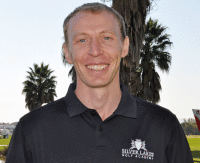
"I was obviously delighted when appointed as it gave me the chance to impart my knowledge to help improve greenkeeping skills across the continent. It's a fantastic opportunity for the students here; a real first in the industry with the top students guaranteed a job after graduation. The course here is maintained by Servest Turf, part of a multi-national facilities management group and they have pledged to employ students at the end of their two-year study programme."
After a convivial dinner, followed by a nightcap around the fire pit at Derek Le Roux's amazing home on the estate, the next morning began with a tour of the course, during which we came across some indigenous animals on an adjacent reserve.
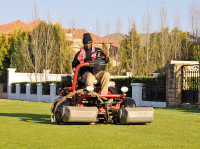
Derek explained that the St Andrews International Greenkeeping Qualification runs alongside Silver Lake's Tour Player Development programme, a two-year study period involving playing skills development and greenkeeping theory and practice.
In the first year of the greenkeeping module, students concentrate on turf maintenance skills including setting mower cutting heights, cylinder to bottom blade adjustment, mowing, routine maintenance, course presentation and health and safety. Year two looks at turf quality evaluation, pest and disease identification, calibration of spraying equipment, golf course hazards, turf nutrition and course design and construction methods.
Students successfully completing Year 1 are awarded an internationally recognised certificate in Golf Course Maintenance, and those that graduate from Year 2 receive a Professional Qualification of Golf Course Management.
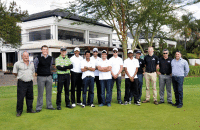
Sitting on the paved patio outside the clubhouse, sipping a fresh orange juice in the glorious sunshine, I then had the chance to speak to some of the students.
Annan Shah is a 21-year old student from Nairobi in Kenya. I asked him how he came to be on the programme; "I had a friend who was a second year student and he told me how valuable the course had been for him," he said. "I applied and was accepted and arrived at Silver Lakes in November 2012, two months prior to the start of the 2013 programme. I really did not appreciate the number of machines it takes to maintain a golf course; there seems to be a different machine for every part of the course! I'm thoroughly enjoying my time here and I would recommend it to anyone."
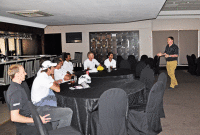
After thanking the students for their time and apologising for delaying their early morning fitness training, I again spoke to Andrew McKenna and asked him how this programme was being funded; "The complete package costs the students SAR 65,000 (£4,100) per annum, so it's outside the range of some of the students from the poorer countries in Africa. Some are here after securing funding and sponsorship from their clubs, local education departments or other benefactors. We are desperate to ensure that this programme is open to all and definitely not elitist, so we looked for a headline sponsor."
"I made some enquiries across my industry contacts and several times the same company kept being mentioned. I knew Ransomes Jacobsen, the UK turf equipment manufacturer, is very committed to education right across the industry, so we contacted their International Business Development Manager, Scott Forrest, and outlined what we were planning to do."
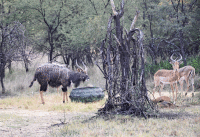
Scott Forrest was my host and he explained why his company agreed to be part of education initiative; "I think it's fair to say that we are known across the industry for our commitment to education, not just in the UK, but right across the globe. For example, in both the USA and UK we run the Jacobsen Future Turf Managers initiative, where top college students and young aspiring superintendents are invited to Charlotte and Ipswich for educational events."
"In Australia, the UK and USA we have sponsorship agreements with turf colleges and universities and, in Asia, we recently sponsored Dr Thom Nikolai, the eminent American turfgrass agronomist, on a speaking tour to help with education in the Far East."
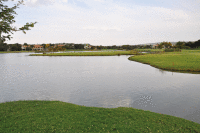
Ransomes Jacobsen commitment to this project is to provide the necessary funding to allow less affluent students to take part in the programme, and the final words from Andrew McKenna sum up the importance of this to the success of the St Andrews International Greenkeeping initiative.
"Our goal, at the outset, was to grow the game in Africa with a three point strategy. First, we wanted to educate African golfers to produce and manage golf courses on the continent, with the St Andrews International Greenkeeping Qualification and the R&A sustainability agenda as a premium focus."
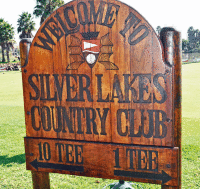
"Next, we wanted to establish Silver Lakes Golf Academy as the hub for golf course management training and education in Africa and, with the assistance of a financial institution, to aid in the distribution of funds for golf development in Africa as a whole."
"And, finally, we wanted to secure funding to offer scholarships to Africa's national golf unions (West, Central, East and Southern Africa) to provide their members with the opportunity to send their young players to the programme through the national unions and golf clubs. With the support from Ransomes Jacobsen, we've succeeded on all three counts!"
